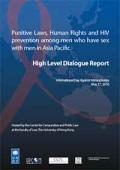Publications - Released in 2010
A significant number of men having sex with men in the Asia Pacific region do not have access to HIV prevention and care services as HIV prevalence has reached alarming levels in many countries. If countries fail to address the legal context of the epidemic, this already critical situation is likely to become worse. The implementation of effective, human rights-based national HIV responses requires governments to consider the effect of laws and law enforcement practices on the health of men who have sex with men (MSM) and transgender persons.
The report's findings and follow up discussion showed that 19 of 48 countries in the Asia Pacific region criminalize male to male sex, and these laws often taken on the force of vigilantism, often leading to abuse and human rights violations. Even in the absence of criminalization, other provisions of law often violate the rights of MSM and transgender persons along with arbitrary and inappropriate enforcement, thereby obstructing HIV interventions, advocacy and outreach, and service delivery. This very debate was at the heart of the recent landmark ruling by the Delhi High Court that Section 377 of the Indian Penal Code unfairly discriminates against men who have sex with men and consenting adults in general.
Downloads
Organizations
- United Nations Development Programme (UNDP)
- Asia Pacific Coalition on Male Sexual Health (APCOM)






